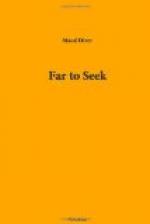He seemed always to be either out in the open, directing events, or very much engaged in the refreshment tent—an earthly Paradise, on this blazing day of early April, to scores of dusty, thirsty, indefatigable men.
Between events, as now, the place was thronged. Every moment, fresh arrivals shouting for ‘drinks.’ Every moment the swish of a syphon, the popping of corks; ginger-beer and lemonade for Indian officers, seated just outside, and permitted by caste rules to refresh themselves ‘English-fashion,’ provided they drank from the pure source of the bottle. Not a Sikh or Rajput of them all would have sullied his caste-purity by drinking from the tumbler used by some admired Sahib, for whom on service he would cheerfully lay down his life. Within the tent were a few—very few—more advanced beings, who had discarded all irksome restrictions and would sooner be shot than address a white man as ‘Sahib.’ Such is India in transition; a welter of incongruities, of shifting perilous uncertainties, of subterranean ferment beneath a surface that still appears very much as it has always been.
Roy—observant and interested as usual—saw, in the brilliant gathering, all the outward and visible signs of security, stability, power. Let those signs be shaken never so little, thought he—and the heavens would fall. But, in spite of grave news from Delhi—that might prove a prelude to eruption—not a ripple stirred on the face of the waters. The grand shamianah was thronged with lively groups of women and men in the lightest of light attire. A British band was enlivening the interlude with musical comedy airs. Stewards were striding about looking important, issuing orders for the next event. And around them all—as close as boundary flags and police would allow—thronged the solid mass of onlookers: soldiers, sepoys, and sowars from every regiment in cantonments; minor officials with their families; ponies and saises and dogs without number; all wedged in by a sea of brown faces and bobbing turbans, thousands of them twenty or thirty deep.
Roy’s eyes, travelling from that vast outer ring to the crowded tent, suddenly saw the whole scene as typical of Anglo-Indian life: the little concentrated world of British men and women, pursuing their own ends, magnificently unmindful of alien eyes—watching, speculating, misunderstanding at every turn; the whole heterogeneous mass drawn and held together by the love of hazard and sport, the spirit of competition without strife that is the corner-stone of British character and the British Empire.
He had just been talking to a C.I.D.[25] man, who had things to say about subterranean rumblings that might have startled those laughing, chaffing groups of men and women. Too vividly his imagination pictured the scenes at Delhi, while his eyes scanned the formidable depths of alien humanity hemming them in, outnumbering them by thousands to one. What if all those friendly faces became suddenly hostile—if the laughter and high-pitched talk changed to the roar of an angry crowd...?




